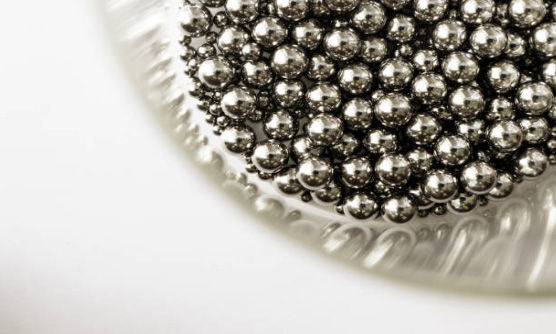Ceramic Hybrid Bearings
Ceramic hybrid bearings are high-performance bearings that use ceramic balls instead of metal, typically steel, balls. They are typically traditional steel rings that incorporate ceramic balls. These bearings are designed to offer superior performance in a variety of applications, primarily due to the unique material properties of ceramic materials, such as:
- Ceramic Balls are lighter than steel balls. This weight advantage causes reduced internal loading and friction in the bearing.
- Any bearing can be configured with Ceramic Balls, and this is the impact on Static and Dynamic capacities: Ceramic Balls are harder than steel balls, at 72 HRC min vs 58 HRC min of steel balls. This also helps to reduce friction in the bearing but will increase the Static contact stress in the bearing, so using hybrid ceramic bearings will reduce the Static Capacity by about 20% compared to steel balls (note that Ceramic Balls do NOT alter the bearing Dynamic Capacity).
The above-mentioned characteristics will lead to less friction, less heat generation and greater speed capability for ceramic hybrid bearing and can lead to longer bearing life.
- Ceramic Balls will perform better in marginal lubrication situations due to the adhesive wear between balls and races.
- Ceramic Balls will increase the Dynamic bearing stiffness.
- Ceramic Balls will provide electrical insulation in a bearing as arcing is eliminated between the ceramic balls and metal races.
- While ceramic balls have higher temperature capability than steel balls, ring materials as well as the entire bearing design must be evaluated to take advantage of the heat resistance of ceramic balls.
- Ceramic balls have a much smaller CTE (coefficient of thermal expansion) than steel balls. This should be taken into consideration for applications with wide temperature ranges.
- Lubrication: Generally, it is always best practice to use either grease, oil or a dry-film lubricant with all rolling element bearings including Ceramic hybrid bearings. Rolling element bearings operating without lubrication is generally not recommended, and actual performance must be evaluated by testing.
The most common Ceramic material for balls is Silicon Nitride (chemical formula Si3N4). These components are generally readily commercially available. There are other ceramic materials available for balls such as Aluminum Oxide (AlO2). For thin-section bearings it is NOT common to make rings of ceramic materials, however this could be evaluated as an option for demanding applications such as those exposed to corrosive gasses or liquids or extreme high temperatures.
Ceramic hybrid bearings are often used in critical high-performance industries such as military and aerospace, space and low-earth orbit, medical equipment, and other general industrial applications. Please contact Silverthin Engineering to determine if Ceramic Hybrid Bearings are right for your application needs.


